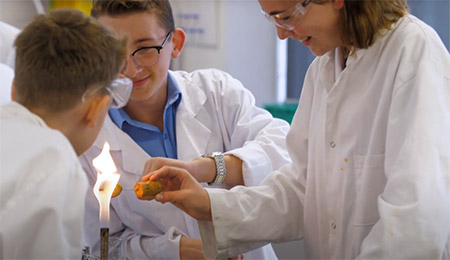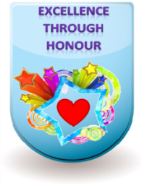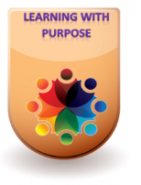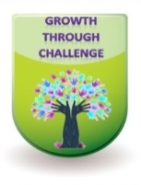The Prince of Peace Difference
On this page
Our Purpose and Mission
Nurture students through quality education, in a caring Christ-centred environment, enabling them to fulfil
their God-given potential and enrich their communities.
On this page
Nurture students through quality education, in a caring Christ-centred environment, enabling them to fulfil
their God-given potential and enrich their communities.
We see graduates who are:
We see our College as deeply valued by others for:
 At Prince of Peace we are extremely proud of our students as they continually strive for personal and academic success. Every student at the College starts the year by setting goals for both academic and other elements of school life. These goals are reviewed throughout the year and celebrated wholeheartedly when met.
At Prince of Peace we are extremely proud of our students as they continually strive for personal and academic success. Every student at the College starts the year by setting goals for both academic and other elements of school life. These goals are reviewed throughout the year and celebrated wholeheartedly when met.
Our Year 12 students continue to achieve with great success, and year upon year they remain well above the Queensland state average. In 2022, 12% of our Year 12 graduates received an ATAR of 95 or higher; 29% of our Year 12 graduates received an ATAR of 90 or higher; and 98% of the students who applied for university (through QTAC) were offered a place. In addition to this, we are very proud to report that 95% of students received their Queensland Certificate of Education and 20% of our students also graduated with a Certificate II or higher.
The College reporting program ensures our parents are kept fully informed of their child’s progress throughout the year, with teachers open to engage in conversation face to face or via email to supplement the formal reporting program.
NAPLAN testing is sat annually by all students in Years 3, 5, 7 and 9. NAPLAN provides a snapshot of individual and the cohort progress for each year. Careful analysis of results by our curriculum leaders ensures that trends within particular groups can be identified and programs developed to address specific needs. Our results in these tests remain particularly pleasing, with all year groups performing well above national and state averages.
Our students are the central focus of all that we do at the College.
Every activity, whether in the classroom, on the sports field, in chapel or off campus is designed to inspire, engage and challenge students to achieve continual academic development and social and emotional growth.
At Prince of Peace, we strive to nurture the God-given potential of each of our students by:
At Prince of Peace, we believe it is vital to nurture a love of learning in all our students and to support them to acquire the skills, values and knowledge needed for modern life. To this end, we endeavour to ensure the key competencies of critical thinking, communication, collaboration and creativity are woven into all learning.
We believe each student’s educational experience should be characterised by three guiding principles that promote contemporary capabilities:

Excellence through honour
We want every student to pursue personal excellence; to honour each other, achieve their God-given potential and to give their best.

Learning with purpose
We wish to prepare all our students to become lifelong learners who are creative, critical thinkers, collaborators and communicators; who are multi-skilled, adaptable and innovative.

Growth through challenge
We believe that it is important that students are provided with opportunities to push themselves, to be challenged to develop mastery in a supportive environment.
We aim to create learners who are:
There are five central elements to our positive learning culture:
Our Teaching and Learning Framework provides more information about these elements.
In looking ahead, it has been important to be mindful of the short but positive history of the College and
continue in our mission as a school of the Lutheran Church. The College is committed to nurturing growth
in a Christ-centred environment that enables our students to enrich the communities they serve. This
strategic plan has been developed with a firm commitment placed upon the College to provide a holistic
education, building upon the Lutheran tradition with initiatives that ensure the young people we educate
are equipped to succeed in a 21st century global community.
Download our Strategic Plan Document [pdf]
Our College is committed to enabling each child to develop to his or her God-given potential through the provision of services to maximise inclusiveness in learning and cater for students’ diverse learning styles and academic needs.
To ensure all students can access the curriculum on the same basis, our specialist support teachers:
We offer intervention for students experiencing short-term problems with literacy, numeracy or learning. We also offer long-term support and program options for students with identified learning difficulties and/or disabilities.
Individual and small group support is provided by the specialist support team. From Prep to Year 2, this support focuses on building students’ oral language and the skills required for reading and writing. Specific intervention is offered as needed.
In Years 3 to 6, learning enrichment programs are provided through small group and individual support. Support is also provided to develop classroom learning tasks for students with specific needs.
Those who require extra challenges beyond those already provided for in the classroom are given specific learning engagement tasks in class and opportunities to take part in workshops and activities focused on their interests, skills and needs.
We aim to include students with learning challenges in general education classrooms as much as possible to ensure they receive learning opportunities to match those of their peers. Programs are designed around the needs of each student involved, and balance time in small-group work with assistance in class and the support required for students to reach their potential.
Support provided by the specialist support team is tailored to individual needs and includes small group and individual support, assignment support and homework or test preparation. This may also include partnering with:
Early intervention is a primary goal of the College. Speech, language, fine and gross motor and visual perception screening occurs amongst Prep students during Term 1. Screenings are undertaken by the College’s on-site speech pathologist and occupational therapist, allowing us to better identify and cater for our students’ educational needs.
Support services, including speech pathology, occupational therapy and psychology, are provided on-site or at providers’ practices on a fee-for-service basis.
Australian Council for Educational Research ability tests are administered to all students in Year 3. Other standardised and diagnostic tools are administered as required to aid appropriate intervention and referrals.
We strongly believe that each child’s success is based upon a mutually supportive partnership between the College and parents.
Throughout the school year we run a structured program of reporting to and communicating with parents about their child’s academic progress and social and emotional development. To complement our formal reporting program, we also offer an open, two-way communication system where parents are encouraged to speak with or email class and subject teachers as required.
An overview of our reporting program and related activities can be viewed here.
At Prince of Peace we encourage our students to be involved with and give to the community, through a service-based leadership model and by supporting a range of charities and causes.
Over recent years the College, through the work of student-led groups, such as the Student Representative Council and the Year 6 Parliament, has supported many good causes, including:
A small group of Year 11 students has the opportunity each year to participate in an ALWS overseas student study tour to gain real insight into the important work of the service.